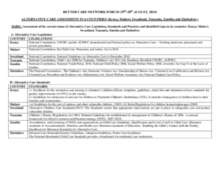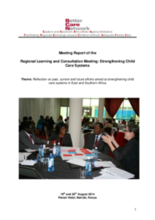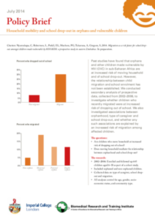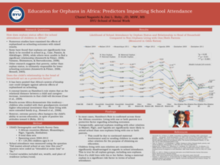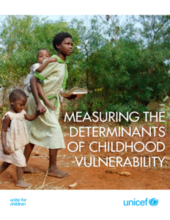Displaying 91 - 100 of 136
The purpose of this study was to investigate the coping strategies of caregivers of HIV/AIDS orphans.
The foundation is seeking to fund a cohort of partners in Shinyanga Region, Tanzania and in Zimbabwe in the following districts: Kadoma, Kwekwe, Gokwe North, Gokwe South, Nkayi, Lupane, Binga, and Hwange that are working on child rights, child protection, or activities that help build children’s emotional health.
Assessment of the current status of Alternative Care Legislation, Standards and Practices and identified Gaps in six countries: Kenya, Malawi, Swaziland, Tanzania, Zambia and Zimbabwe.
Following a consultative mapping, a regional learning meeting took place on 19-20 August 2014 in Nairobi, Kenya. The theme of this meeting was "Reflection on past, current and future efforts aimed at strengthening child care systems in East and Southern Africa."
The IATT CABA has commissioned a piece of work that seeks to identify approaches, interventions and tools that have effectively supported linkages between the child protection and HIV sectors, with a focus on three countries – Nigeria, Zambia and Zimbabwe – but featuring examples of promising practices or approaches from elsewhere.
This policy brief provides an overview of research from 2002-2006 on whether children in Zimbabwe who recently migrated were at increased risk of dropping out of school, including research questions, findings, and conclusions.
Comment les réseaux sociaux solides soutiennent les enfants d’Afrique subsaharienne et leurs familles. Les enfants et les familles vulnérables ont besoin d’un système de soutien social qui réponde aux problèmes qu’ils rencontrent grâce à des solutions efficaces et durables. Les observations présentées dans ce rapport sont un « cliché instantané » des pratiques prometteuses en matière de développement et de pérennité de la communauté.
This powerful chart illustrates preliminary research findings using data from Demographic and Health Surveys (DHS) in 5 African countries (Malawi, Mozambique, Niger, Uganda and Zimbabwe) to better understand how orphan status affects the school attendance of children in Africa and the extent to which living in kinship care can act as a protective factor in this context.
This study by UNICEF sought to identify key determinants of vulnerability among children –including those affected by HIV and AIDS – that can contribute to developing an improved global measure of vulnerable children in the context of HIV and AIDS. Data from the most recent available household surveys at the time of analysis was used from 11 countries – Cambodia, Central African Republic, Haiti, Malawi, Rwanda, Sierra Leone, Swaziland, Uganda, United Republic of Tanzania, Zambia and Zimbabwe – were pooled.
The Ministry of Public Service, Labour and Social Welfare’s Department of Child Welfare and Probation Services in Zimbabwe is inviting applications from suitably qualified and experienced individuals or organisations to undertake a Baseline Survey on Children Deprived of Parental Care Living in Residential Child Care Facilities.

